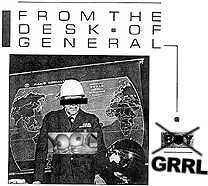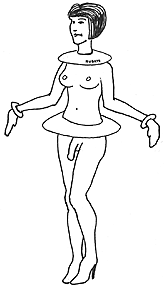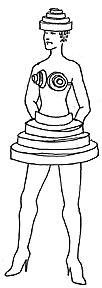|
terre thaemlitz writings 執筆 |
|
Oh, No! It's Rubato Piano Interpretations of Devo Titles Arranged & Performed by Terre Thaemlitz - Terre Thaemlitz |
Originally posted on comatonse.com July, 2001. Accompanying text to the album of the same name (Germany: Mille Plateaux, 10/2001), MP103. Devo image parodies by Terre. A few copies of the original Mille Plateaux CD release are still available from the Comatonse Online Shop. Click here to view original release artwork.

List of Tracks
- Gut Feeling/(Slap Your Mammy)
- Jocko Homo
- Mongoloid
- Space Junk
- Blockhead
- Whip It
- Through Being Cool
- Out of Sync
- Deep Sleep
- Patterns
- The 4th Dimension
- (Secret Track)
  Attention Superthings: Let me tell you a story. Let me shovel some dirt. The DEVO boys of summer are cruisin' Sunset Boulevard in a deep sleep, going under cover with 2.2 kids and a turkey in every car. We can only hope that secret agents Mark Mothersbaugh, Jerry Casale, Bob Mothersbaugh (Bob #1) and Bob Casale (Bob #2) are continuing their covert operations at Mutato Muzika, sleeping amidst spiritless giants who should know better but don't. DEVO's Chinese Computer Rock'n'Roll has devolved into the soundtracks of commercials for McDonalds, Toyota, Coca-Cola, Sony and Nickelodeon. Italy's newly elected Facist-tainted government uses the term "devolution" to identify their project to decentralize power by reinforcing regionalism, leading to the sanctioned local ostracization of immigrants. Meanwhile, a restless secret agent Alan Myers maintains his cover as an electrician, waiting bravely and patiently for the signal. Fear not. Today I am the bearer of great news to scatter the blackest frown. Facing the possible loss of our most important de-evolutionary troopers, General Boy has been removed from his prophylactic tour of duty. What's that you say? "Is this gal for real?" You betcha. Command of the De-evolutionary Army has been passed to the Big Sister with a wiggle in the middle, General Grrl, and I'm still shouting, "Entertainment remains the cancer that we must eradicate!" The Devol takes on many forms, and even the weakest link strengthens the chain. Don't be fooled by promises of a kinder, strofter nation from the Evil energies of the Digital Music Business, the endless supply of so-called "glitch music," and the laptop jockeys who live in the past along with our leaders. A record distributor lays crouched behind every bank teller's window across the land. It's time to de-value the strange pursuit of commodities and oversized novelty foam hands announcing whose team is #1. We're all in for the big lose together. To help us march down that road of de-valuation, I am happy to announce that Prof. Thaemlitz has emerged from the lab with yet another worthless addition to the Rubato piano series, "Oh, no! It's RUBATO." She's the man with a plan, his finger pointed at DEVO. Now they must sacrifice themselves that many others may live. Okay, they've got a lot to give. Hop off the band wagon and lend your ears to DEVO de-evolved, out of sync, jerkin' back'n'forth, not necessarily beautiful but mutated. Every spud and spudess must repeat: Q: Are we not men? A: We are DEVA!
|
Growing Blunder
- Think you've heard this all before
Now you're going to hear some more
I know a place where dreams get crushed
Hopes are smashed
But that ain't much
Voluntary experimentation
Going through some computations
- DEVO, "Going Under"
How does one begin such a potential blunder as covering songs by a band who produced and distributed kitsch muzak versions of their own 'popular music' recordings at the same time as, or shortly after, the release of each album? Although kitsch is certainly a factor in these recordings, will kitsch overshadow their larger stylistic subtext of critically invoking neo-expressionist and high Modernist composition strategies within the electronica marketplace? How does one embrace or abandon issues of language recognition when de-evolving DEVO's original compositions into instrumental arrangements, considering every good spudess instinctively recites lyrics simply upon hearing the band's name? If the compositions are too literal, we've heard it all before.... If they are too abstract, hopes of recognition get smashed.... As I begin voluntarily turning my computations to the often mathematically tedious task of reconstructing and reworking DEVO's compositions for piano, I've got a gut feeling that more dreams may get crushed by the result than with the previous two installments of the Rubato series which reworked titles by Kraftwerk and Gary Numan. Something about the way this tastes makes me want to clear my throat.... I've got a gut feeling....
Patterns (Compositional)
- Patterns unfamiliar
Patterns lead you through (to)
Patterns of discovery
Tracing out the clues
Can you recognize the patterns that you find
Stuck in your mind? Patterns multiplying
Re-direct our view
Endless variations
Make it all seem new
- DEVO, "Patterns"
Step 1: Repeatedly play a selected DEVO song, stepping each instrument's notes into the computer one by one. Be amazed at DEVO's strange mathematics and random insertion of extraneous eighth notes into a song's meter. Bore your friends with this newfound information, and start planning your own nerdy shifts in meter - possibly even a waltz or two.
Step 2: Digitally layer, detune, rekey, invert, reverse, compress, expand and/or otherwise alter selected passages. Don't be bashful about not understanding key and chord structures. Technical error is the signifier of a genius' deliberate deviation from the norm.
Step 3: Reconstruct the composition with an ear for neo-expressionist gesture and rubato tempo. Deliberately invoking the sound of an institutionalized avant-garde within the contemporary electronica marketplace implies a shared conservatism to be critical of. It also draws attention to the limitations and desires of one's own commentary.
Step 4: Feel free to layer digitally composed annotation with bursts of improvisation for that 'human touch.' Remember the key to all good comedy is timing.
Step 5: Play back the reconstructed composition using a resonant acoustic piano sound that contrasts sharply with the synthetic electronic sounds used in DEVO's original recordings. Additive noise distorts and clouds like interpretive processes. Resonance mimics the frustrating search for resonant melodic phrases and associations with DEVO's original compositions and thematics.

Soft Things
- You find a longer wavelength
You hear a deeper note
It's a buried treasure that she doesn't hide
- DEVO, "Soft Things"
The use of piano in these digitally composed recordings - and in the Rubato series as a whole - is intended to invoke a relationship between signifiers of both digital and analogue sound within a larger framework of non-essentialist gender- and identity-based discourse. In the simplest of terms, Western gender antagonisms between female and male continue to rest in the traditional dichotomy of Mother Nature versus the Man Machine. This binaural engendering of society along lines of female and male extends to the private versus the public, the domicile versus the workplace, emotion versus logic, naivete versus genius, etc. It is within such a cultural framework that machine-based electronica producers have come to be commonly described as "boys with toys." Conversely, acoustic instruments such as the piano are traditionally classified as feminized tools - "ladies" domesticated at the hands of their masters.
The Rubato series' combination of "masculine" digital composition processes with a "feminine" piano sound is not an attempt to invert, nor subvert, the traditional Western gender paradigm. Nor is it a simple "either/or" replacement of the original producers' "masculine" sound with a "feminine" one. Rather, it is an attempt to arrive at a sound of multiple and irresolvable associations (what I termed the "Femme Machine" in Die Roboter Rubato). Similarly, the predominant strategy behind the digital compositions themselves is to dress expectations of real-time performance in drag, resulting in arrangements which sound like beautiful mutants, mutually natural and impossible, erroneous and flawless.... An incorporation of simultaneous and contradictory identification processes which perpetually recontextualize the modes of production, as well as the desires of the producer.... A transgendered subtext for those who wish to hear it.
THROUGH BEING COOL- If you live in a small town
You might meet a dozen or two
Young alien types who step out
And dare to declare
"We're through being cool"
- DEVO, "Through Being Cool"
I was thirteen when my older brother brought home a copy of New Traditionalists. I promptly taped it and began parading through my aspiring-to-be-suburban rural neighborhood at the Northern outskirts of Springfield, U.S.A., playing it as loud as my single-speaker tape recorder with half-dead batteries would allow. Urgently electronic, drilling and motorized, this music was too important to keep bottled inside my monophonic ear plug (you know the kind... a single beige plug that looks like a hearing aid). It commanded me to become a prick in the ears of all suburban robots that monitor reality. Shortly thereafter, I met a kid named Joe Fago (great name!) who shared my interest in DEVO. After a quick exchange of favorite lyrics, we became best spuds... and the Fago Spud had connections with Springfield's underbelly. Suddenly I was part of an actual social network related to a form of electronic music.
Whereas much of the electronic music I listened to at the time seemed better suited for private listening, DEVO's music tended to imply an odd sociability among outsiders. If Kraftwerk and Yellow Magic Orchestra inspired fantasies of imaginary audiences comprised of clean-cut Futurists, DEVO seemed in touch with the reality of my oversized glasses, no-name sneakers, pin-striped jeans, Sears "Dragon"-logo polo shirt, ash-rose colored knock-off of a Members Only jacket, Mom's rhinestone jewelry collection, and hair parted to the side.
Perhaps a large part of DEVO's social resonance was related to their incessant turn-of-phrase use of Americanisms in their lyrics (give one listen to "That's Pep" and you'll know what I mean). The words were immediately familiar, placing positions of authority through the looking glass by tapping into a listener's existing sense of hypocrisy in the myth of Rugged American Individualism. The lyrics were quickly learned because they manipulated a common language of signs, easily filling the vacuums of space in our heads dedicated to Americana with volumes of DEVO's space junk. For myself, this relationship to an overtly American electronic music experience was radically different from the estranging envy triggered by European and Japanese idealism.
Post Post-Modern Man
- If I had a hammer
I'd wake up my neighbors
Pounding out a rhythm
All about you
...But I ain't got a hammer
...So I'm doing it the hard way
Like a Post Post-Modern Man
- DEVO, "Post Post-Modern Man"
Borrowing imagery and credos from turn-of-the-century Futurists and Constructivists, much European and Japanese Techno-Pop of the 1970s and '80s contained the revolutionary ideal of an aesthetic Techno-otherness moving from the vanguard of society into its core, raising the quality of life and fashion for all people as it did so. (Today, we see this myth alive and well among internet developers.) In such a model of cultural transformation, the social "other" brings diversity from outside dominant culture into its core. For DEVO, the social "other" - that social element who is most removed from an ability to consciously influence the mechanisms of dominant culture - consists of the mainstream monkeys who pursue culture's ideals blind to their own estrangement of self. Capitalist processes of reification drag us through time, with no promise of progress or (r)evolution. Pinstripe suits or working-class Joes, there are no class heroes. The de-evolution of society is symbolized by this increased demand to pursue a life of complexity without consciousness. As Jerry noted in a 1988 interview for Modern Keyboard:
- On the one hand, there are people who bump and grind in the groin and have no life of the mind. Then there are the crazy, psycho white people who live in their heads and are detached from their genitals. They are as off-base in the other direction as the dolts.... You end up with the same problems in the same place no matter what end you're coming from.
(Modern Keyboard, October 1988.)
Of course, this outlook also shares many similarities with ultra-Modernist writers such as William S. Burroughs, of whom Mark and Jerry were both big fans. It also suffers from many of the same dangers by generalizing a shared "Human condition," as well as a mythical antagonism between mind and body split along class lines of wealthy ("white") intellectualism versus impoverished hedonism. As pointed out by Hannah Bosma, a gender-musicologist affiliated with NEAR and the University of Amsterdam:
- It is an important myth that does not correspond with reality. Richer and higher educated people are in general (statistically) more healthy and have a better sex life than poor and low educated people. Especially high educated women have, in general, a better sex life than low educated women. It is a myth that managers pay for their high income with stress related diseases; in fact, men with power are more healthy, more happy and less stressful than men with less power.
(Taken from personal correspondence, July 2001.)
This seems to explain some of the choices made by DEVO members in more recent years. At the same time, it is important to note that DEVO's sarcastic critiques are always launched from within a frame of self-conscious, pussy-driven American White Maleness. In a 1982 Trouser Press interview conducted by Burroughs himself, Jerry made this distinction clear:
- JC: We base our aesthetic on self-deprecating humor. We include ourselves in it.... We have that sense - maybe that's the midwestern [American] part - that sense of shame about being human.
WSB: Everybody does. That's part of being human.
JC: But dealing with it and admitting it is rare. The masses are bad spuds who resort to defense mechanisms like fundamentalist religion and other psychotic values, far-rightists who deny it because they cannot deal with it. They've worked themselves into a constipated corner where to admit it is threatening to the rigid order they created. Good spuds have the ability to make fun of themselves.
(Trouser Press, February 1982.)
the de-evolutionary protagonist is a post-Modern Pinnochio who wakes into his long desired Humanity at the precise moment he realizes that Humanity is bestowed by the prejudiced and homogenizing cultural forces from which he seeks to distance himself. He admits the construction of his individual sense of self was hammered into shape by external cultural forces. He finds himself robbed not only of self-liberation, but of possessing the very tools through which he believed he had shaped his own identity. There is no chance for Individualism, nor individual influence. No personal hammer with which to shape oneself or others. It's not a matter of tearing down the master's house with his own tools. It's finding yourself empty handed and realizing you are the tool.

Marching in a Deep Sleep
- I've been walking in a deep sleep
Sleepwalking but I just woke up
From a deep sleep
A very deep sleep
I've been running on remote control
In a deep sleep
I awoke the moment I was told
A smile is just a frown turned around
On the face of a clown with a mean streak
- DEVO, "Deep Sleep"
Unlike the classic Modernist, DEVO doesn't waste any time lamenting Individualism's loss... it is simply another ideal learned and regurgitated ad nauseam by the jesters in our heads. Instead, they poke fun at the Individual. Every strange pursuit of love and economy is traced back to it's roots in commercial habituation and discount semiotics, from Ronald McDonald to Ronald Reagan. Because dominant culture conditions us to be ashamed of difference, the majority of people find refuge and anonymity within conformity, propagated through base-level sloganistic ideologies. And according to the American Individualist notion "You can do anything if you put your mind to it," the unspoken and shamefule implication is that when things do go wrong, the fault must rest in our own lack of ambition.
But the apple of social pride isn't only rotten at it's core. Even among 'fringe identity' political movements, the desire to overcome internalized notions of shame typically lay at their heart. For example, in keeping with the cliche justification for Gay/Lesbian/Transgendered Pride Day, "Every other day is Heterosexual Pride Day," the importance of Pride Day itself is not that it shows evidence of communal pride, but that it provides a necessary deviation from the difficulties of ongoing shame. A shared moment of unknowing. Ronald McRainbow to the rescue....
- It was a deep sleep
A very deep sleep
I can't remember what I used to know
Somebody help me now and let me go
Into a deep sleep
Push me back and let me go
Into a dream again
To a sleep unlike before
So deep it never ends
I've been caught inside a deep sleep
Sleepwalking as I watch myself
In a deep sleep
I keep pretending that it's someone else
- DEVO, "Deep Sleep"
Jocko Homo
- We must repeat
- DEVO, "Jocko Homo"
As I felt compelled to observe about Kraftwerk's music in the notes to my album, Die Roboter Rubato, what is Homoerotic is not necessarily Queer empowering (example 1: a football player's snap of a towel against the buttocks of a teammate in a high school locker room). This observation may also apply to more direct inferences of explicit sex acts (example 2: those same Jocks raping an accused Faggot in said locker room). Similarly, given DEVO's rather exclusive emphasis on Heteronormative sexuality (although typically in parody), as well as their ceaseless invocation of genetics and breeding, it would be a stretch to say DEVO directly gives voice to Queer concerns. However, in the broader sense of the term, DEVO's music is certainly "queer," outside, and demandingly inter-categorical.
Perhaps of most interest to me is the way in which their twisted appropriation of Americanisms mirrors Queer discourses' use of linguistic re-appropriation as an expression of categorical deviance. Similarly, whereas Queers are often accused by Lesbian and Gay communities of creating factions among "ourselves," so DEVO never let their nerd status stop them from telling the squares how it is. There's a deliberate degree of ambiguity as to whether DEVO's language is targeting mainstream culture within the sites of it's own language, or simply mimicking the mainstream's ridicule of non-conformist spuds. But as Jerry observed, there's a price for playing the role of the outside agitator among us at the fringe who continually prompts an investigation of the odd alliances resulting from our internalization of mainstream desires:
- We're accused all the time of pessimism.... Because we question popular mythologies about progress and the value structure it's all based on as being absolutely rancid, then of course we're accused of having sour grapes.... Possibly we're even as popular as we are because we're misperceived as sickness.
(Trouser Press, February 1982.)
As any social "others" who have been patronizingly granted a chance to "make their voices heard" by a traditionally adversarial crowd can tell you, it is this association with sickness - being identified as a self-destructing cultural element - which can mask the urgency of our actions in a momentary guise of harmlessness. On the one hand, associations with sickness (figurative or literal) can facilitate our access to unexpectedly mainstream forums for discussion, offering high visibility to otherwise suppressed subject matter. On the other hand, the terms of discussion are often dictated by the oppressive codes of decorum which we seek to transform. In the end, "our" material requirements predictably defer to "their" semantics. Another ribbon campaign is successfully underway, our heads filled with thoughts of the children. As they say, it's easy to break into prison. The difficulty is getting back out.
Mongoloid
- -And he wore a hat
And he had a job
And he brought home the bacon
So that no-one knew
He was a Mongoloid, a Mongoloid
One chromosome too many
Mongoloid, he was a Mongoloid
And it determined what he could see
Mongoloid, he was a Mongoloid
His friends were unaware
Mongoloid, he was a Mongoloid
And nobody even cared
- DEVO, "Mongoloid"
A brash example of the de-evolutionary terror and shame of recognizing the defective outsider among us - within us - was recently experienced by a friend of mine who is a Japanese ex-patriot living in Germany. She happened to spot a man at a party who resembled a handsome Japanese actor (we'll call the man "Booji Boy," after the son of General Boy, who represents the infantile spirit of de-evolution). Given Booji Boy's features and dark hair, she thought that perhaps he had Asian descendents, although it was unclear. She decided to convey her compliment to the man, adding that his features were somewhat "Mongoloid," implying "Asiatic." Booji Boy cringed in disgust, "Do I look like a fucking, disgusting Mongoloid?" Shocked and confused by his response, she replied, "No, I'm saying you look like a very handsome Japanese actor... and I am a Mongoloid! WE look Mongoloid!" Booji Boy ran off cursing. My friend began to consider his possible misinterpretation of the term "Mongoloid" in relation to Down's Syndrome, which only made his response all the more layered, hostile and inappropriate. There was obviously something about the image of a "Mongoloid," be it the genetics of race, differences of culture, or a congenital mental condition, which compelled Booji Boy to deny and reject all possible associations - to literally run away from them. To this day he continues to greet her at social events with a hostile glare from across the room, avoiding her at all costs.
Booji Boy's got issues.
 Still, anyone who has been involved in communal outreach of one kind or another has experienced peoples' resistance to identify as "other." Not only does it involve a fear of rejection, but the act of admitting one's otherness involves a momentary psycho-surgical extraction of oneself from an ideological cultural core. The lure of empowerment is accompanied by the threat of isolation... or more poignantly, acknowledging the isolation which one is already accustomed to denying. Unfortunately, direct action does not have a one-to-one relationship with social necessity. Billions live with ongoing famine, brutality, and other repressive circumstances. It requires a certain Kamikaze attitude to go beyond the normal thing:
Still, anyone who has been involved in communal outreach of one kind or another has experienced peoples' resistance to identify as "other." Not only does it involve a fear of rejection, but the act of admitting one's otherness involves a momentary psycho-surgical extraction of oneself from an ideological cultural core. The lure of empowerment is accompanied by the threat of isolation... or more poignantly, acknowledging the isolation which one is already accustomed to denying. Unfortunately, direct action does not have a one-to-one relationship with social necessity. Billions live with ongoing famine, brutality, and other repressive circumstances. It requires a certain Kamikaze attitude to go beyond the normal thing:
- Now why do you think that a man
Jumps out of the frying pan
Into the fire when he can
Find a way not to get burned?
...I must do what I must do
And I do though I know better
I must do what I must do
(Even though he's gonna get it!)
- DEVO, "What I Must Do"
But how does one avoid the romantic pratfalls of martyrdom? What happens to such an attitude in the aftermath of 'activist burn-out'? Or how might such an attitude de-evolve if the links to 'community' were over-abstracted to begin with? Jerry and Mark mused on Michael Jackson's self-declared role as a child advocate:
- JC: [Michael's] taken it upon himself to be a martyr, in a Peter Pan way, to save the children of the world, [but ] it's hard for the average person to relate to a guy who spent $500,000 mutating his face....
-MM: Michael amazes me.... We've been going to his plastic surgeon, having the parts sewn on that he's been taking off. He's been going through reductive synthesis and we've been going through additive synthesis.
(Modern Keyboard, October 1988.)
Out of Sync
Speaking of economies of plastic surgery... I always find myself drawn to a particular DEVO song's invocation of the transsexual crisis between a desire for transformation, and the perpetuation of a female/male gender dark age:
- She's out of sync and everyone around her knows that something is wrong
She's out of sync she's got all the symptoms of a girl who skipped a beat
She's out of sync a piece of ancient history she's a walking mirage
She's out of sync she entered through the exit and never stopped to think
She's out of sync she's a half step behind
She's out of luck her body split from her mind
She's out of orbit she'll never connect
She'll run out of time before she accepts she's out of sync
She's out of sync everybody senses there's a distance to keep
She's out of sync and totally committed to living in a dark age
She's out of sync constantly undoing what's already been done
She's out of sync trapped in a silent movie and she's on the brink
She's out of focus she's a warp in time
She's discontinued a break in the line
- DEVO, "Out of Sync"
Taking my own biases as a non-op Transgendered Queer into consideration, it still seems to me that the 'progress' of both Transsexual and Transgendered communities come with a heaping spoonful of de-evolution. Advocacy for gender multiplicity on a public level bears the converse acknowledgment that on a private level little Susie wishes he was a real boy, plain and simple. But unlike Pinnochio, nothing grows on little Susie when he tells a lie. And so many Transgendered people find that a step forward in the acceptance of their own gender multiplicity is inextricably linked to their contrary desire for reconciliation with the dominant binary gender system of male and female... a vestige of antiquity which always seems to rear it's head in the form of Greta, Audrey, Liz, or Liza.
The Biggest Little Business Down on the Block
Speaking of superstars and the entertainment industry... DEVO has historically been at odds with their sugar daddies at the big American record companies, playing the Puppet Boy who avenges his manipulation by occasionally tangling his own strings. "We had a plan and the more popular we got, the more stuff we laid on people," said Jerry, "By New Traditionalists, having sold over a million records, we were being taken seriously and [the record companies] expected us to play ball. Well, we didn't. We were out criticizing TV evangelism, right wing politics.... At that point, we got in trouble because people were paying attention for the first time and it mattered to [the record companies]," (Modern Keyboard, October 1988). The result was DEVO's gradual relegation to a more "moderate" financial level, with its economic limitations taken in trade for increased creative liberties.
Although much of my own work has absorbed this antagonism between funding and facilitating discourse, compared to DEVO this Puppet Grrl's economic critique is typically downsized to a scale incremental to my comparative anti-stardom: that biggest little business down on the block, the electronica marketplace.
- I got my money tied up in stock
...Me, I got the biggest little business
Down on the block
Get ready, get set
'Cause we gonna clockout
Down on all fours
'Cause we gonna clockout
...Gonna gag
Unless we clockout
- DEVO, "Clockout"
If the late-'80s boom of independent electronica claimed an interest in avoiding the marketplace (at least among producers), and mid-'90s electronica expressed a desire to transform the marketplace, the current state of affairs seems to indicate little more than a final capitulation to the marketplace. There's no denying the desire to cash in and clock out. Consider the undeniable transformation of so many 'rave' organizers from self-purported Anarchists into Capitalist benefactors. Today, it's an accepted fact that you can't hold a 'profitless' Burning Man Festival or Love Parade (...or Pride Parade) without financial injections from multi-national alcohol, tobacco, clothing and beverage concerns renowned for their violations of workers' rights - not to mention human rights. There are even those who believe such events are besting the mega-conglomerates. After all, if we're doing "what we want" with "their money," doesn't that give us the upper hand? While it is naive to assume a radical rejection of all things Capitalist or Western (sorry to break the hearts of all you radical pagan faeries out there), it is far more dangerous when one's complicity with such cultural mechanisms goes unquestioned. (This is where DEVO's demands for responsibility and duty come into play, if only I could invoke such terms without laughing.)
As a technology-driven media, the thirtysome-year climb of electronica into the music distributor's canon of genres holds many similarities to other technology-influenced economies. Given my past activities as manager of a college Apple Computer store, and more recently as a freelance web designer, I cannot help but notice several disturbing parallels between the growth of electronica and the internet. Like the commercial rise of the "people's" internet, many of electronica's key players find no contradiction between claiming to foster a cultural periphery while aspiring to conquer the stock market. (You might even be able to draw some parallels between last year's collapse of America's Internet bubble-economy, and the music industry's panic when the Ambient marketplace collapsed in the mid-'90s - everyone scrambled to decide if electronica was still a viable market.) Like the internet industry's shift in attention from "alternative home businesses" to the multi-million dollar client, so the majority of electronica labels find themselves increasingly swept up in procedures which solely target industry, distributors and advertisement-based press. Like the internet has been transformed from a military network into an academic privilege into a corporate advertising tool, so has electronica liberated digital synthesis from the tedium of academia to fill our lives with video game and movie soundtrack filler, product tie-ins, and Jocko football anthems. (Consider Calvin Klein's use of Markus Popp, Ford's use of Juan Atkins, or Volkswagen's use of The Orb. Even car dealers in my hometown of Springfield, U.S.A. use the syncopations of drum'n'bass to sell pick-up trucks to rednecks - an odd sound without context in an otherwise electronica-free community.) Like the manner in which emerging internet development tools have transformed the role of website designers from people involved in several tiers of technology into single-task assembly line drones, so has the broadened market of home recording equipment and software generated musical genres recognizable by their producers' software plug-ins. (Case and point: Native Instruments' sponsorship of a 2001 Sonar Festival showcase featuring Richard Devine, Mike Dred and Jake Mandell playing to video projections of N.I. corporate logos inhabiting a people-less city of abstract CAD architecture.) In the same manner that the internet's promise to "bring us the world" overlooks the reality of technology's current limitations (typified by advertisements featuring computer monitors with interfaceless television-style images popping through their screens into the rooms of end-users), so has the meme of real time signal processing's potential to 'transform' musical performance trained audiences to ignore the bored expressions of laptop orchestras as they fence us in with mindlessly formalist walls of dull grey sound. Sound so monolithic and homogenous that I can't possibly imagine how it fails to convey any politic other than totalitarianism. And like internet content's ever-increasing shit factor of scams and spams has shown how little information is ultimately important to anyone, so has electronica taken us into the bedroom studios of everyone and their father... and what sexless, empty bedrooms they tend to be.

All We Ask is that You Let Us Serve It Your Way
- I been dipped in double meaning
I been stuck with static cling
Think I got a rupto-pac
Think I got a Big Mac attack
- DEVO, "Too Much Paranoias"
Although it appears contradictory to assert that the mainstream entertainment industry remains the most viable means for producers of 'alternative' and 'experimental' electronica to support ourselves, it becomes increasingly clear this is the case - particularly in countries with little to no governmental funding of the arts, such as the U.S. and Japan. (Although both commercial and government funding implicate producers within economies of compromise, my distrust of and alienation from government process makes me find the latter more disturbing. This is also undoubtedly related to my studying visual arts at a time when U.S. conservatives targeting Homosexual media successfully eliminated virtually all public funding of the arts - making concrete the notion of the U.S. government being in opposition to the arts. Furthermore, America lacks Europe's historical link between the arts and governmental patronage, which remains understandable to me only in relation to a regal history of hierarchic social oppression. Nevertheless, it is no secret that my rent has been paid on more than one occasion by participating in European state-funded events.) The ultimate contradiction between electronica and big business is not one of social relations, but merely one of ideals... and realized profits. As Dont Rhine of Ultra-red recently told me:
- When the DEVO boys realized they weren't going to support their families, their mansions and their lifestyles doing left-field kitsch muzak, they turned to music for films and advertising. Now within electronica you have a milieu of musicians who make more money from one perfume commercial than an entire career of recordings and touring. Could anyone turn that down? How can someone have their industrial critique and music career at the same time - especially after you realize the only viable music career is one beholden to advertising and Hollywood?
(Taken from personal correspondence, July 2001.)
We won't get into Dont's dirty little career secret. But as for me, while it has been easy to keep my solemn vow never to remix Madonna in protest of her decontextualization of community-specific music and dances from issues of race, sexuality and gender, I will confess that the appeal of momentary financial stability keeps me from ruling out much else. (Un)luckily, it has been relatively easy for me to retain my image as a character of high ideals. For the moment, when I lay my head down each night I can still appreciate the difference between, say, DJ Spooky's Geffen-powered ascension into Homophobic hip hop, and Snd's unwilling (and comparatively unprofitable) role as grandmothers of a 'glitch' micro-house movement that has de-evolved into the very type of dance-culture economy they set out to avoid. Speaking of which, I can't forget to tip the hat of hypocrisy toward my own dance floor, as I personally enjoy mixing 'glitch' with the older NY house music of which the best tracks are so tirelessly referential.
Patterns (Cultural)
- Patterns all around you
Patterns everywhere
Patterns of behavior
Sometimes seem unfair
Can you recognize the patterns that you find?
In this land where stability is hard to find
You can rearrange the patterns so unkind
Don't bother asking why a pattern never cries
Old patterns never die they just go on an on
- DEVO, "Patterns"
While technology has facilitated a tremendous flow of audio information, it seems we are still unable to dramatically transform cultural patterns surrounding music production, performance and consumption. The days of naively hailing the DJ's subversion of center-stage stardom are long past. As producers we retain our allure as Artists, masters of sonic vagueries that strike the same chords of 'universality' as newspaper horoscopes. As a communicative medium, most music conveys little more than the random vocabulary of an ancient parrot whose trainer vanished generations ago. Even when audio samples make explicit references to other compositions/contexts/histories, the results rarely surpass nostalgic affect. Melodic peek-a-boo. Laugh if you want to, or say you don't care. If you cannot see it you think it's not there. It doesn't work that way. Peek-a-boo! I know what you do 'cause I do it to.
(We must) repeat disc.

